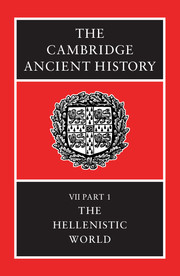Book contents
- Frontmatter
- 1 Sources for the period
- 2 The succession to Alexander
- 3 Monarchies and monarchic Ideas
- 4 The formation of the Hellenistic kingdoms
- 5 Ptolemaic Egypt
- 6 Syria and the East
- 7 Macedonia and Greece
- 8 Cultural, social and economic features of the Hellenistic world
- 9 Hellenistic science: its application in peace and war
- 10 Agathocles
- 11 The Syrian-Egyptian Wars and the new lingdoms of Asia Minor
- 12 Macedonia and the Greek leagues
- BIBLIOGRAPHY
- Index
- Map 3. Egypt.
- Map 4. Hellenistic Asia.
- Map 5. The Greek mainland and the Aegean.
- References
4 - The formation of the Hellenistic kingdoms
Published online by Cambridge University Press: 28 March 2008
- Frontmatter
- 1 Sources for the period
- 2 The succession to Alexander
- 3 Monarchies and monarchic Ideas
- 4 The formation of the Hellenistic kingdoms
- 5 Ptolemaic Egypt
- 6 Syria and the East
- 7 Macedonia and Greece
- 8 Cultural, social and economic features of the Hellenistic world
- 9 Hellenistic science: its application in peace and war
- 10 Agathocles
- 11 The Syrian-Egyptian Wars and the new lingdoms of Asia Minor
- 12 Macedonia and the Greek leagues
- BIBLIOGRAPHY
- Index
- Map 3. Egypt.
- Map 4. Hellenistic Asia.
- Map 5. The Greek mainland and the Aegean.
- References
Summary
THE ADVENTURES OF DEMETRIUS POLIORCETES (301–286)
Having narrowly escaped from the massacre of Ipsus, Demetrius Poliorcetes had hurled himself at Ephesus: Asia might be lost, but he had to keep control of the sea. At sea, the position of Antigonus' son remained solid. The confederation of the Nesiotes remained, for the moment, loyal to him and Cyprus was still firmly in his grasp, as were a number of coastal towns in Asia, from Asia Minor (though here Lysimachus rapidly established his power, which made the inhabitants long for the days of Antigonus) to Phoenicia (Tyre, Sidon). In European Greece, where Pyrrhus of Epirus, from exile, was for a time Demetrius' representative, the recently restored League of Corinth soon fell apart and Demetrius found himself restricted to a certain number of seaboard towns, chief of which was Corinth. To his great disappointment, Athens gave him notice: the servility of the Athenians had enabled them to tolerate many extravagances on Demetrius' part and even many sacrileges (such as the installation of his harem in the Parthenon and his scandalously irregular initiation at Eleusis), but the bill was heavy. Freed from the costly encumbrance of Demetrius' protection, the Athenians, under the semi-tyrannical government of Lachares, lost no time in renewing their ties with Cassander, whose eviction had been the occasion for wild rejoicing in 307. Happily for Demetrius, he still had his fleet (the Athenians even returned to him the squadron posted in their waters) and was indisputably master of the sea.
Keywords
- Type
- Chapter
- Information
- The Cambridge Ancient History , pp. 101 - 117Publisher: Cambridge University PressPrint publication year: 1984
References
- 6
- Cited by

